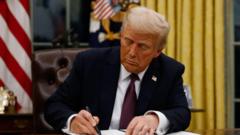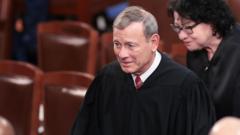In a notable legal intervention, Judge Loren AliKhan has issued a temporary stay on President Donald Trump's directive to freeze hundreds of billions in federal grants and loans, just moments before the measure was set to take effect. The decision follows a lawsuit from numerous organizations claiming that the unilateral financial freeze breaches legal protocols, and that it threatens essential funding programs across the nation.
Judge Halts Trump's Federal Funding Freeze Amid Controversy

Judge Halts Trump's Federal Funding Freeze Amid Controversy
A US judge intervenes, temporarily blocking Trump's plan to suspend federal grants and loans, affecting numerous organizations.
The White House had announced this pause on funding as an initiative to evaluate governmental spending concerning diversity and inclusion, which they deem "woke." This announcement led to immediate backlash, casting confusion and concern over the implications for various federal assistance programs, particularly for non-profits and research institutions who rely heavily on federal grants. With Judge AliKhan’s ruling, the status quo is preserved until further arguments can be made on the case.
In her ruling, which comes into effect until next Monday, Judge AliKhan emphasized the need to maintain current funding structures, enabling essential services to continue unabated. This order not only affects disaster relief efforts but also significantly touches on cancer research funding, raising alarm among those dependent on federal support to operate.
Diane Yentel, President of the National Council of Nonprofits, heralded the court’s decision as a victory for grant recipients, stressing that Trump's plan would have jeopardized crucial federal programs. Yentel described the order as broad-reaching and lacking necessary justification, underscoring that the loss of funding could have serious ripple effects across multiple sectors.
In the wake of this decision, opposition figures have ramped up their criticism of Trump's funding freeze as being overly expansive and potentially unconstitutional, reflecting a divided political landscape. With confusion persisting as to which programs may still see funding disruptions, concerns over critical services could continue to echo throughout the upcoming legal discussions.
As federal agencies grapple with their next steps amidst the ongoing legal battles, the conversation around federal funding and its implications takes center stage, with implications that could resonate into many facets of American life and governance.
In her ruling, which comes into effect until next Monday, Judge AliKhan emphasized the need to maintain current funding structures, enabling essential services to continue unabated. This order not only affects disaster relief efforts but also significantly touches on cancer research funding, raising alarm among those dependent on federal support to operate.
Diane Yentel, President of the National Council of Nonprofits, heralded the court’s decision as a victory for grant recipients, stressing that Trump's plan would have jeopardized crucial federal programs. Yentel described the order as broad-reaching and lacking necessary justification, underscoring that the loss of funding could have serious ripple effects across multiple sectors.
In the wake of this decision, opposition figures have ramped up their criticism of Trump's funding freeze as being overly expansive and potentially unconstitutional, reflecting a divided political landscape. With confusion persisting as to which programs may still see funding disruptions, concerns over critical services could continue to echo throughout the upcoming legal discussions.
As federal agencies grapple with their next steps amidst the ongoing legal battles, the conversation around federal funding and its implications takes center stage, with implications that could resonate into many facets of American life and governance.






















